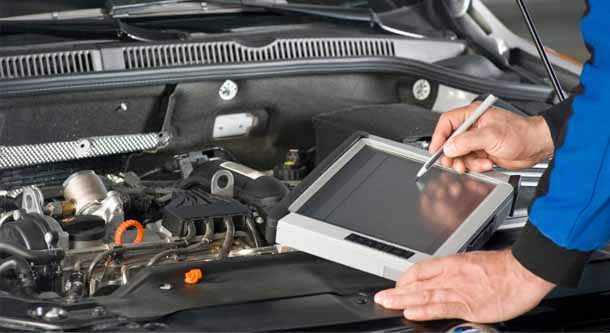Weird noises happen all the time. When you start up your vehicle,
accelerate or even step on the brakes, you may hear noises that weren’t
there before. In this case, you may need repairs to be made immediately.
Thankfully, most noises are indicators of a problem that will get worse
if you don’t have them remedied, but will allow you to still drive to
the auto repair shop for a repair.
Clunking Sound When Braking
If you step on the brakes and hear a clunking sound, there are three likely causes:
- Steering system
- Brake calipers
- Brake hardware
All of these components will indicate that your vehicle should be brought to a shop for maintenance.
Squealing Brakes
One of the most common noises. Many brakes have an indicator on them
that will make the brakes squeal when applied. If you hear squealing
that is
only present when braking, you will likely need:
There is also the chance that dirt entered into the rotors, drums or
shoes and is making a loud noise. If you have recently had brake work
done on your vehicle, this may also be a sign of improper caliber
installation.
Grinding When Shifting
Depending on your transmission type, grinding when shifting can be a variety of different things, including:
- Worn clutch
- Internal transmission damage
- Adjustments needed to a clutch
If you are lucky, adjustments will be the only maintenance needed. Otherwise, internal damage can be very costly to repair.
Squealing Coming from the Engine
Loud squeals coming from the engine often occur during acceleration,
but in severe cases, these squeals may be present when idling. What
causes these squeals?
- Drive belts that are sleeping or loose
- Drive pulleys not aligned properly
- Worn or stretched belts that need replacement
Popping Sound from the Engine
Engine popping can be a variety of different problems. You will want
to see a mechanic immediately, but normally, the problem is not severe.
Popping and hesitation are often seen in the engine when:
- Air or fuel filters are clogged
- Water has seeped into the gasoline
- Spark plugs or spark plug wires are dirty, worn or need to be replaced
There are other problems that may cause popping including the carburetor or catalytic convertor.
Rattling Coming from the Rear
Rattling sounds that come from the back of the vehicle are often
exhaust problems. A loose bolt or mounting bracket may be the only
problem.
Clicking When Turning
Do you hear a clicking sound when turning? This can be:
- Brake pads that are loose
- CV-joints that are worn
You will want to seek immediate maintenance at this point.
Loud Squealing When Turning
Extremely loud squealing when turning is often a sign of a worn ball joint. This will need immediate replacement.
Popping Noise in the Back of the Vehicle
When accelerating, fuel injectors or a hole in the car’s exhaust may
cause a loud popping sound. Leaks in the exhaust or fuel injectors are
the common culprit and will need to be repaired by a professional.
Engine Ticking
Engines that tick are quite common. The most common problems that cause ticking include:
- Engine valves being stuck or that need adjustment
- Sludge in the engine
- Valve lifters that have collapsed
If your vehicle is making an odd noise, it is time for you to bring
it into the shop for maintenance. This will allow you to have your
vehicle inspected and repaired promptly before any major damage is seen.







.jpg)
.jpg)
